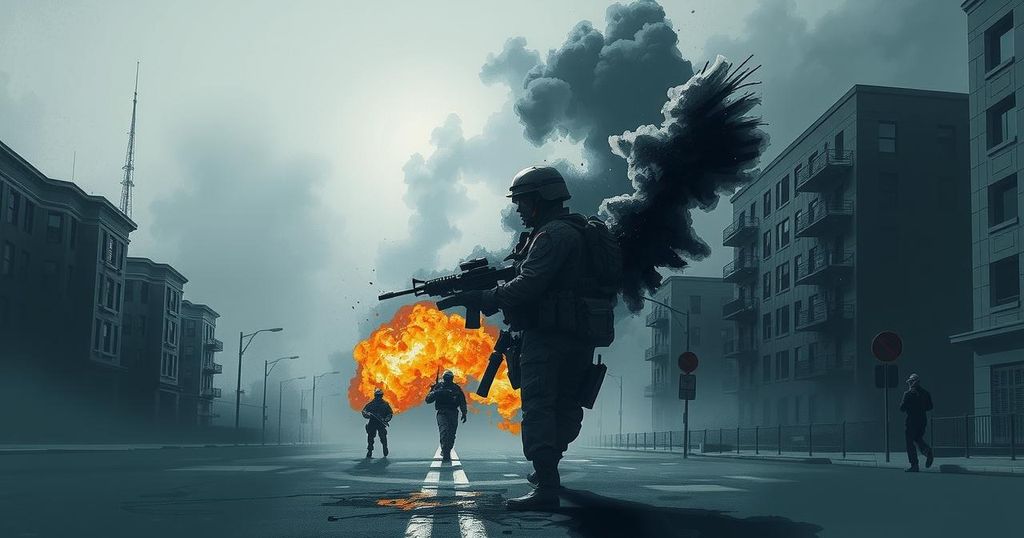Global news
ABBAS ARAQCHI, AFRICA, AL -, AL - CAIRO, ARAQCHI, ASIA, CAIRO, CEASEFIRE NEGOTIATIONS, CONFLICT, DUBAI, EGYPT, EUROPE, GAZA, GAZA CITY, GAZA STRIP, HAMAS, HOSTAGE NEGOTIATIONS, IRAN, ISRAELI DEFENSE MINISTRY, ITALY, MIDDLE EAST, MILITARY OPERATIONS, NORTH AMERICA, OMAN, PALESTINIAN ISLAMIC JIHAD, PI, ROME, STEVE WITKOFF, TA, TEHRAN, UNITED ARAB EMIRATES, UNITED STATES, US
Fatima Khan
0 Comments
IDF Launches Strikes on Hamas in Gaza, Expands Military Operations Amid Global Tensions
The IDF has targeted Hamas and PIJ operations in Gaza, striking a currency exchange believed to fund terrorism. Concurrently, inconclusive nuclear talks with Iran have created tensions, while a criminal investigation in Peru against an IDF soldier adds another layer of complexity. A recent poll indicates widespread public belief that political motives guide Netanyahu’s handling of hostage negotiations.
In the latest developments in the Middle East, the Israel Defense Forces (IDF) have conducted significant military strikes targeting Hamas and Palestinian Islamic Jihad (PIJ) operations in Gaza. Over the course of Thursday night, the IDF specifically hit the “Al-Cairo” currency exchange office in Gaza City, which it alleges has been actively involved in financing terrorism. This office, formerly known as “Dubai,” was accused of storing and transferring considerable sums of money directly supporting terrorist activities.
In a recent statement, the IDF claimed that this exchange office had facilitated the transference of tens of millions of dollars to Hamas, further sustaining their military operations. Notably, the IDF cited the killing of a worker associated with the exchange in 2024 who was reportedly pivotal in funding these terrorist efforts as part of their justification for targeting the site. Military operations by the IDF are also expected to expand across Gaza, with reports indicating that residents in the southern region can expect to hear explosions overnight.
Concurrently, diplomatic talks regarding Iran’s nuclear program concluded in Rome without a concrete agreement. US special envoy Steve Witkoff held talks with Iranian representatives, where both sides acknowledged progress but also expressed the need for further discussions. A senior US official remarked that while the talks had displayed a degree of constructiveness, alternatives—including military options—were not off the table should an agreement continue to evade negotiation.
Iranian Foreign Minister Abbas Araqchi also spoke positively about the discussions, emphasizing the complexity of the issues involved and asserting optimism towards future negotiations. He stated that Oman’s mediation efforts played a valuable role, suggesting that ongoing discussions might lead to a more optimistic outcome.
In another significant matter, Peru has initiated a criminal investigation against an IDF soldier following a complaint lodged by the Hind Rajab Foundation. This organization alleges that the soldier participated in the extensive destruction of civilian neighborhoods during the recent military operations in Gaza. The foundation’s chairman asserted the imperative of justice in this sensitive case, citing the necessity of accountability.
Attention has also turned to Israeli political dynamics, as a new poll revealed that a significant portion of the Israeli populace, over half, believes Prime Minister Netanyahu is deliberately obstructing a hostage deal for political gain. Results showed that 53% of participants think the government’s hesitation is tied to political motives, a sentiment particularly strong among coalition voters.
In related developments, Netanyahu endorsed Maj.-Gen. David Zini as the incoming head of Shin Bet, despite prior concerns over a conflict of interest incited by ongoing probes into the “Qatargate” affair. Netanyahu’s office stressed that the appointment of Zini aligns with national security priorities, especially during this turbulent period.
However, Zini’s past comments expressing opposition to hostage deals during discussions have raised alarms among families of the hostages still held in Gaza. This skepticism about his approach to negotiations has sparked worries that his leadership may hinder efforts to secure the release of those remaining captives.
The tension in the region persists, as the cycle of violence continues to escalate. Hamas’s aggressive actions earlier this month led to the kidnapping of 240 hostages and the tragic loss of over 1,200 lives, underscoring the existing humanitarian crisis. As the situation evolves, both military actions and diplomatic efforts remain closely scrutinized by international observers and citizens alike.
In summary, the recent actions by the IDF against Hamas-linked financial operations and the ongoing inconclusive nuclear negotiations with Iran illustrate a period of heightened tension in the Middle East. The investigation into IDF activities in Peru, alongside changing dynamics in Israeli leadership and public sentiment regarding hostage negotiations, adds further complexity to an already volatile situation. As military operations expand, the implications for both regional security and humanitarian efforts are profound, demanding vigilance from both local and global communities.
Original Source: www.jpost.com




Post Comment